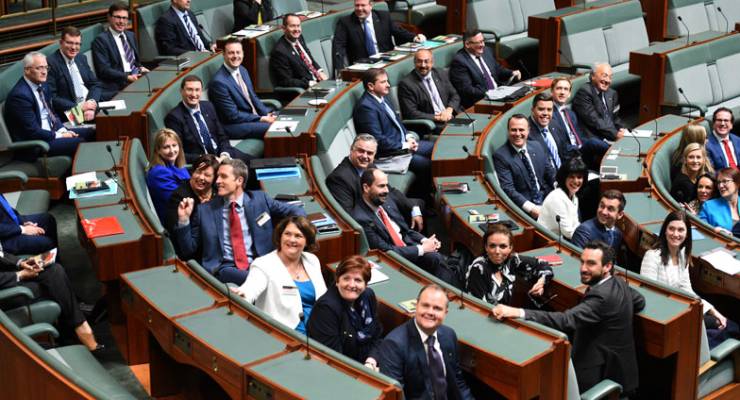
Australia’s House of Representatives is scheduled to sit only 51 days this year. The Senate is sitting even fewer days — just 42. The government, meanwhile, has struggled all year to get legislation passed. Could more time in Parliament help?
Next week Australia’s Parliament will resume for the first time since May 4. The long break is thanks to the election campaign, but although this year’s low number of sitting days is well below the House of Representatives’ 2011-2015 average of 66 days, it is roughly in line with how often the House sat in the year of the 2013 election (48 days).
By the standards of many of Australia’s state governments, even these figures are high.
Victoria’s Parliament didn’t meet at all in July, giving MPs almost two months to indulge in the traditional fact-finding missions around the world. Victoria’s lower house has just 52 days in which to pass legislation all year. In New South Wales, it’s 57. South Australia’s lower house has 51 days to pass legislation; Queensland’s sole house has 43. Tasmania has 49 sitting days (not including two House sitting days for budget estimates). West Australia has 57 sitting days.
In the NT this year, the Legislative Assembly is sitting for 29 days. An election on August 27 means it won’t be sitting between June 29 and September 13. In the ACT, MPs are sitting just 24 days.
Would government be better if our parliaments sat more often? We asked two former MPs, who were sceptical.
Maxine McKew, a journalist who for one term served as the member for Bennelong in inner-city Sydney, says she can see the argument for slightly longer sitting periods. Steve Gibbons, the former member for Bendigo, says governments should require Parliament to sit as long as required to get through their legislative program — more ambitious governments will perhaps need more days to get things done.
[Mayne: pay MPs more and 9 other ways to improve Australian politics]
But both McKew and Gibbons said much of the work of MPs — particularly those on the backbench — does not happen in Canberra.
McKew said voters would be wrong to assume the lower number of sitting days mean MPs don’t work hard. “Most politicians work harder than anyone I know,” she told Crikey, adding that 80-hour weeks weren’t uncommon. “It was the most satisfying but also the most demanding work I have ever done. I worked hard as a journalist, but frankly, compared with life as an elected representative, it was a doddle.”
Gibbons, retired since 2013, spent 15 years representing the rural Victorian seat of Bendigo. “I was just a backbencher, but for me, going to Canberra was almost like going for a rest,” he said.
“When you get to Canberra, all you’ve got to do is prepare for speeches, make the speeches, and otherwise just turn up.”
“Sure it was long hours, but that’s fine. When you’re in the electorate, particularly in a regional marginal seat, what you do in the electorate is the most important thing. Not least of which is making sure you get re-elected.”
“Plenty of people talk themselves out of the place by banging on about things in the chamber.”
The way Gibbons describes it, there’s a fine balance in Parliament between the needs of the backbenchers — who have electorates they need to tend to — and of the ministers, who need to be in Canberra to fight to pass the legislation they want. A government that mandates parliamentary sitting days may find itself voted out because its marginal seat holders didn’t spend enough time in their electorates, while a government that doesn’t spend enough time in Parliament won’t get its legislative agenda through.
For the opposition leadership, Parliament also gives it a chance to hold the government to account — something harder to do without mechanisms like question time. Canberra is where the national political media are based — it’s a lot easier to build relationships and plant stories from the ACT. And it’s where many of the bureaucrats are; MPs get briefings in Canberra they don’t get elsewhere.
But other parts of policymaking do not take place in Canberra. Parliamentary committees, where members of different parties work together (ideally) to investigate policy and make recommendations, tend to meet in capital cities when Parliament isn’t sitting.
And then there’s constituent work. An energetic staff member can get a lot done for their community, says McKew. Sure, staffers help, “but in the end it’s the MP who is the mover and shaker”.
If we want more effective government, McKew doubts more time in Canberra is the metric we should be maximising. “The main problem these days is not around the volume of work — there is no end to it,” she said. “[But it’s] how effectively our MPs are able to work together on solving significant national issues.
“Most MPs are bright and energetic but none of it adds up to collective wisdom or problem-solving. And I don’t know the answer to that one!”
As for Gibbons, one gets the sense his proudest achievements were things done for his local community from his Bendigo office. Reflecting on his years in Parliament, he said: “It’d be the greatest job in the world if you didn’t have to go to Canberra.”








Crikey is committed to hosting lively discussions. Help us keep the conversation useful, interesting and welcoming. We aim to publish comments quickly in the interest of promoting robust conversation, but we’re a small team and we deploy filters to protect against legal risk. Occasionally your comment may be held up while we review, but we’re working as fast as we can to keep the conversation rolling.
The Crikey comment section is members-only content. Please subscribe to leave a comment.
The Crikey comment section is members-only content. Please login to leave a comment.